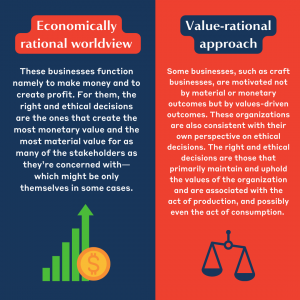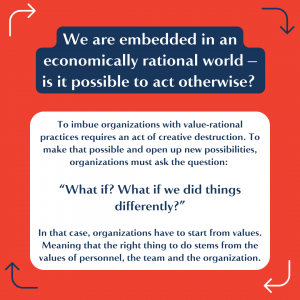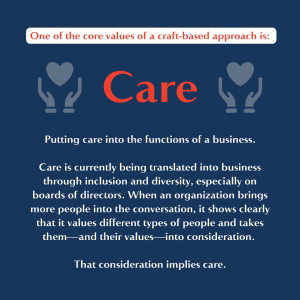Craft business, such as microbreweries and ethical chocolate companies, has seen a rise in the past several years, with many claiming to put values over excessive profit. Meanwhile, larger, more economically driven businesses have imploded in the wake of questionable decision making. Are craft businesses somehow more ethical or moral than others? Or is business ethics an oxymoron? The answer depends on values.
Subscribe:
On the Delve podcast, Jo-Ellen Pozner, a professor at the Santa Clara University Leavey School of Business, joins Desautels Professor and Delve Editor-in-Chief Saku Mantere in an inspired conversation that asks how ethics affects the ways that businesses fundamentally function, from everyday operations to how leadership and boards make strategic decisions.
Pozner’s research focuses on questions of organizational ethics, corporate governance, social evaluation, and social movements. In that, she examines how we make sense of and evaluate others. Most recently, she investigated social movements and markets related to craft production, such as bean-to-bar chocolate, micro-breweries, low-power FM radio, and organic farming. She has also studied wrongdoing, scandal, and organizational misconduct by management and boards of directors. On both counts, she’s well-equipped to define business ethics in both broad and specific terms, and open up a larger conversation about its future.
Read on for an excerpt of Pozner and Mantere’s conversation, listen to the full podcast episode for more research-based insights, and watch the Laidley Centre for Business Ethics March 2023 event with Pozner, “Is Business Ethics an Oxymoron?”
Saku Mantere: Business ethics, is there such a thing?
Jo-Ellen Pozner: I think that there are plenty of folks who assume that business and ethics are incompatible. I take a very different view. Most people want to be good people, most people like to think about themselves as good people, and most people don’t think about it very often. So we get ethical lapses. Not because folks are intentionally doing things that they know to be wrong, but because they don’t often enough interrogate their motives, their values, and their actions, and they make heuristic decisions that then contradict their values. There are also pressures that create incentives to make moral compromises. But fundamentally, most people go to work every day wanting to make good, thoughtful, value-consistent decisions—and sometimes they miss the mark.
Saku Mantere: You don’t automatically become Darth Vader when you enter the executive suite, the role doesn’t corrupt you immediately, at least. It’s a bit more subtle than that.
Jo-Ellen Pozner: When we’re talking about upper echelons, it gets a little bit more complicated and nuanced, because I don’t think that you become Darth Vader overnight… There’s an interaction between a selection issue and between the position and the person that that might make it more likely. I don’t necessarily believe that most upper managers are immoral or unethical people; sometimes we’re put in situations where we have to make quick decisions, and they’re not always value-consistent.
Saku Mantere: There are corrupting influences that come with executive positions, but then there might be an antidote to those influences?
My definition of ethical behaviour is really about making value-consistent decisions.
Jo-Ellen Pozner: I certainly think that we are better equipped to be thoughtful when we have already engaged in the process of being thoughtful for ourselves. My definition of ethical behaviour is really about making value-consistent decisions. That suggests that implicit in that definition is the idea that everybody has values, and that it’s possible to act in accordance with those values. Note that I’m not making judgments about a hierarchy of values or which values are more noble—and that does allow for the idea that some people are purely motivated by profit, and that anything they do in pursuit of profit is therefore ethical.
As long as you’re making decisions that are consistent with your own values, the stated values of the organization, I find it difficult to argue with that; I’m not going to question your process. I might question the outcome. Implicit in that definition, is the idea that we have been thoughtful about our own value systems. That varies from person to person and from organization to organization. If we are in a shareholder value-maximizing world, that will lead to a very particular set of decisions and outcomes. And if we’re in a stakeholder-service world, that will lead to a different set of values and decisions and outcomes. I think both allow for people to be thoughtful and make ethical decisions, but they’re going to look very different.
Saku Mantere: There’s been a lot of interest in craft industries of late. It seems that it’s a field of research that’s blossoming. You’ve been one of the pioneers in breaking new ground in studying craft-based organizations. It’s one context where the value of making a profit is often one value among many. What view of business ethics emerges from that type of context?
Jo-Ellen Pozner: Craft production is all about not just the use value of the product, or the value of the money that I earn from it, but the values that are contained in the production of the product, the meaning, the symbolism, the significance culturally and historically of the product itself. And the means through which it’s produced, where the maker, because of their investment in human capital and skill and discernment, imbues the product with value. The production process that they use, which is often small batch and using traditional or quasi-traditional methods, is value-laden itself; that creates additional value for the product.
Saku Mantere: What is a paradox perspective when we talk about ethics in particular?
Jo-Ellen Pozner: There is paradox created or experienced when we’re producing a well-known product using well-known technology for a homogeneous generalist audience. I know what to do, I know how to do it; my identity isn’t called into question, my motives aren’t called into question. When we get into something like craft or small-batch production, or just very niche production, irrespective of production technology, then the motives sometimes look a bit more ambiguous.
That understanding of the product and the production comes from an economically rational worldview: we do things to make money, we do things because that creates profit. The right decision, that ethical decision, is the one that creates the most monetary value, most material value for as many of the stakeholders as we’re concerned with, which might be just ourselves. But things become more complicated when we understand that some people are motivated not by material outcomes, not by monetary outcomes, but by values-driven outcomes… The right thing to do is the thing that maintains and upholds the values that I associate with the act of production, and possibly even the act of consumption.
Saku Mantere: One of the reasons why the craft movement has been so compelling is that it questions these practitioners, the assumption that it’s only the outcomes of your activity that means: what also has significance is how you do things. When you talk about value rationality, I’m thinking about how the very practice of business is infused with value. The craft movement is a way of challenging… You can actually care about ethics in the way that you’re practicing your business.
There are many possible ways of acting otherwise.
Jo-Ellen Pozner: There are there are good and bad ways of conducting yourself in any domain, there are multiple ways of enacting any goal. And we as a society for the past 200 years have been pushing people to maximize profit at all costs and then to enact values privately. I think there’s received wisdom, or at least assumed wisdom, that that’s the only way to do things, or that’s the correct way to do things, and that there’s no possible way of acting otherwise. But in fact, there are many possible ways of acting otherwise.
For the full conversation between Jo-Ellen Pozner and Saku Mantere, listen to the Delve podcast episode.
Delve would also like to thank the Desautels Faculty of Management’s Laidley Centre for Business Ethics, which invited professor Pozner to speak about her research at McGill in March 2023.
This episode of the Delve podcast is produced by Delve and Robyn Fadden. Original music by Saku Mantere.
Delve is the official thought leadership platform of McGill University’s Desautels Faculty of Management. Subscribe to the Delve podcast on all major podcast platforms, including Apple podcasts and Spotify, and follow Delve on LinkedIn, Facebook, Twitter, Instagram, and YouTube.

















